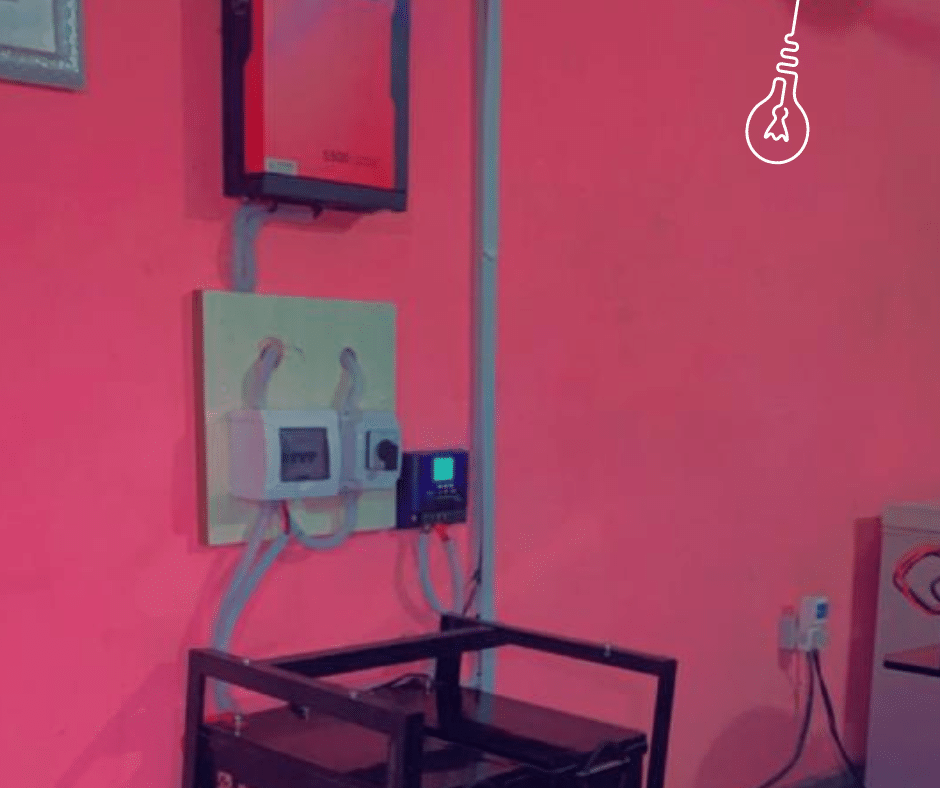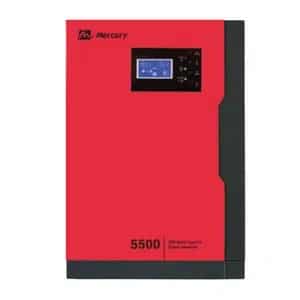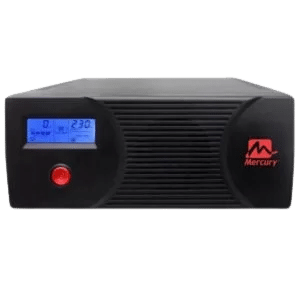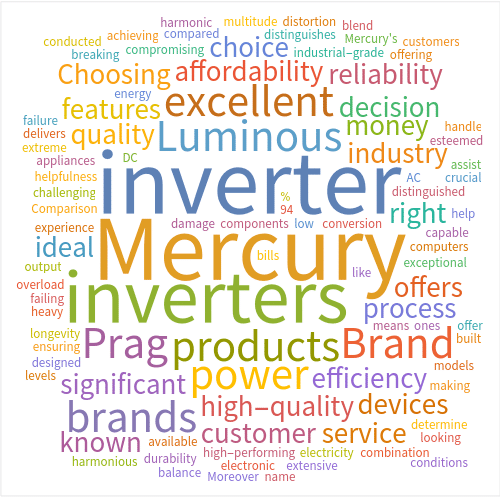Choosing the Right Inverter: A Comprehensive Guide

Are you planning to go off-grid, camping, or just need a backup power source in case of emergencies? If so, then an inverter is a must-have item for you. An inverter is an electronic device that converts DC (Direct Current) power from a battery into AC (Alternating Current) power that can be used to power various devices.
Many people make the mistake of choosing the wrong inverter and end up with underpowered equipment or damaged appliances. It’s important to choose the right inverter that matches your needs and requirements to avoid these issues.
In this article, we will guide you through the process of selecting the right inverter for your needs. We’ll cover everything from determining your power needs to understanding different types of inverters, size and capacity considerations, brand comparison, battery compatibility, and inverter efficiency. By the end of this article, you’ll be able to make an informed decision on the right inverter for you.
Why is choosing the right inverter important?
Choosing the wrong inverter can have serious consequences. If you choose an underpowered inverter it won’t be able to supply enough power for your appliances or devices which can lead it not working correctly.
A low-quality or incorrect type of wave could lead it damaging sensitive electronics like Playstation consoles or network servers. If you’re using an off-grid solar system with batteries as your primary source of energy, then choosing a poor quality or incorrectly sized Inverter could lead it having damaged battery banks leading to premature replacement costs.
In addition, if you’re using an incorrect type of wave-form that doesn’t match what appliances require could result in poor performance such as motors running inefficiently leading it longer run times while consuming more energy than needed meaning more fuel consumption or battery depletion. Therefore, it’s important to choose the right inverter that can meet your needs and requirements to avoid such devastating consequences.
Types of Inverters
Pure Sine Wave Inverters

These are the cream of the crop, providing power identical to the supply from your utility company. They’re perfect for sensitive electronics like computers,refrigerators and air conditioners. Learn more about the differences between Pure Sine Wave and Modified Sine Wave Inverters. For additional insights, you can visit RNOGY
Modified Sine Wave Inverters

A more economical choice, these inverters are suitable for simpler appliances like fans,lights and televisions. They’re not recommended for delicate electronics, as they can cause them to malfunction or reduce their lifespan.
Sizing Your Inverter
Determining your power needs based on the appliances and devices you plan to use with the inverter
Before purchasing an inverter, it’s important to determine your power needs. This means taking a closer look at the appliances and devices you plan to use with the inverter.
Start by making a list of all the electronics and appliances you want to be able to power with your inverter. Next, determine how many watts each item uses.
This information can typically be found on a label or plate located on the back or bottom of each device/appliance. If you’re unable to find this information, try looking up the product online.
Once you have this information for all your electronics, add up their individual wattage requirements. This will give you a total number of watts needed for all your devices combined.
Calculating wattage requirements
After making a list of all your devices/appliances and determining their individual wattage requirements, it’s time to calculate how many watts your inverter needs to provide. To do this, start by adding together the highest continuous wattage required by any single device on your list. This is often referred to as “peak load” or “surge wattage.”
Next, add together the continuous wattages required by each device on your list that will be running simultaneously. This will give you a total number of continuous watts required for all items at once.
Don’t forget to factor in any additional devices/appliances that may need powering during emergencies or unforeseen circumstances. It’s important not only calculate these numbers accurately but also leave some wiggle room when choosing an inverter.
A good rule of thumb is to opt for an inverter that is double the size of the load you intend to run. This approach not only safeguards against potential overload but also leaves room for the addition of more appliances in the future.
By taking the time to assess your power needs and calculate wattage requirements, you’ll be well on your way to selecting the right inverter for your needs.
For more detailed guidance on sizing your inverter, you can refer to this Power Inverter Buying Guide from Mercury.
Battery Compatibility

The inverter and battery are akin to a well-coordinated team, and their compatibility is crucial for optimal performance. The voltage of your inverter should match that of your battery system to ensure efficient and safe operation. For instance, a 12V battery system will require a 12V inverter, and the same principle applies to other voltage levels.
However, voltage compatibility is just the tip of the iceberg when it comes to battery and inverter compatibility. There are several other factors to consider:
- Battery Type: Not all inverters are compatible with all types of batteries. Some inverters work best with lead-acid batteries, while others are designed to work with lithium-ion batteries. Make sure to check the specifications of your inverter to ensure it is compatible with your chosen battery type.
- Battery Capacity: The capacity of your battery, measured in ampere-hours (Ah), should be sufficient to meet the power demand of your inverter. A battery with too low capacity may not be able to provide power for the required duration, while a battery with excess capacity may lead to unnecessary costs.
- Charge Controller Compatibility: If you’re using a solar power system, your inverter needs to be compatible with the charge controller, which regulates the power coming from the solar panels to the batteries. Some inverters come with built-in charge controllers, but if yours doesn’t, you’ll need to ensure that your standalone charge controller is compatible with both your inverter and your battery.
- Battery Bank Configuration: Depending on your power needs, you may need to connect multiple batteries together to form a battery bank. The configuration of this battery bank (series, parallel, or a combination of both) can affect the voltage and capacity of the overall system, and your inverter needs to be compatible with this configuration.
To sum up, choosing the right inverter involves more than just matching the voltage with your battery system. It’s a comprehensive process that requires considering the type, capacity, and configuration of your batteries, as well as the compatibility with other components of your power system. By paying attention to these details, you can ensure a smooth and efficient operation of your inverter, thereby maximizing the lifespan and performance of your entire power system.
Use our handy Battery Backup Time Calculator to estimate how many hours backup your inverter battery will give you. Check out these 10 Simple Ways To Extend The Life Of Your Inverter Battery. For additional information on battery compatibility.
Inverter Efficiency
Look for an inverter with a high efficiency rating. This means it converts the battery’s DC power into AC power with minimal losses, ensuring you get the most out of your battery.
Extra Features
Modern inverters come with a host of additional features like LCD displays, overload protection, and auto shut-off. While not essential, these features can make using your inverter a more convenient and safe experience.
Brand Comparison
Choosing the right inverter is a crucial decision, and the brand you select plays a significant role in this. With a multitude of brands available, it can be challenging to determine which ones are reliable. To assist you in this process, we’ve compared some of the top brands in the industry.
Mercury
Mercury is a distinguished name in the inverter industry, renowned for its high-quality power output and reliability. One of the standout features of Mercury inverters is their low harmonic distortion levels, making them ideal for sensitive electronic devices like computers and televisions. Mercury inverters strike an excellent balance between price and performance, offering affordability without compromising on quality. Moreover, Mercury’s customer service is known for its responsiveness and helpfulness, ensuring a smooth experience for customers.
Luminous
Luminous is another esteemed brand that offers a range of high-quality inverters. They are known for their durability and longevity, a testament to the extensive research and testing conducted on their products. Luminous inverters are also recognized for their efficiency, with their pure sine wave models capable of achieving up to 94% efficiency. This means less energy is wasted during the conversion process from DC power to AC power, potentially saving you money on your electricity bills over time.
Prag
If you’re looking for an inverter that can handle heavy use, Prag might be the ideal choice for you. Their products are built with industrial-grade components designed to withstand extreme conditions without failing or breaking down. Prag inverters also offer excellent safety features, such as over-voltage, under-voltage, and overload protection. These safeguards help prevent damage to your appliances and devices, as well as protecting the inverter itself from failure.
Choosing the Right Inverter is a significant decision, and while all these brands provide quality products, Mercury distinguishes itself. It offers a harmonious blend of affordability, reliability, and exceptional customer service.
This unique combination positions Mercury as an excellent choice for those in search of a high-performing inverter that delivers true value for money.
Conclusion
Choosing the right inverter is not a task to be taken lightly. It requires careful consideration and a clear understanding of your power needs. But with this guide in hand, you’re well-equipped to make an informed decision.
Remember, the right inverter is not just a purchase; it’s an investment in the electrical harmony of your home. For more information, check out the Nigeria Inverter Buying Guide 2023 and the Inverter Frequently Asked Questions on Mercury Direct.
Also, consider the benefits of solar energy for your business. Here’s an article on How Solar Energy Can Benefit Your Business. For more insights on solar power inverters, you can visit Aurora Solar.
Remember, Mercury Direct is your one-stop shop for reliable and cost-effective power solutions in Nigeria. Explore our wide range of high-quality Mercury inverters, deep cycle batteries, solar panels, UPS, and stabilizers to power your home or business. Visit Mercury Direct today.
